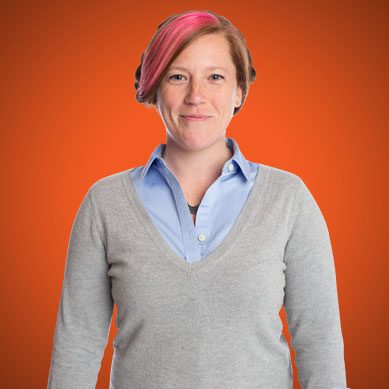Kathleen (“Kae”) McCarty recently completed her PhD in kinesiology in the Department of Public Health and Human Sciences at Oregon State University. She is a member of Health Policy Research Scholars Cohort 2018.
Tell us a little bit about yourself and what your research interests are.
Oof, loaded question. Let me stick to the interesting bits: I’m a queer, neurodivergent, cis white woman who studies health, fitness, and sport for people with disabilities using critical perspectives.
What’s the story behind why you’re doing what you’re doing?
In my master’s program, I worked at a university adaptive fitness clinic which trained kinesiology undergraduates to work with community members with a disability in fitness settings. I also worked at the YMCA and was heading a project to create a more welcoming and inclusive environment through staff training and disability awareness. While volunteering at a junior sports camp, a young woman lamented to me that she had to move across the country to keep playing her wheelchair sport at an elite, collegiate level because there were so few opportunities for her. After doing some research, I started an adaptive sport program at my university. However, the process was surprisingly difficult and I wondered if I was just bad at my job or if my experience was not novel. So I set off to do a PhD and my dissertation focuses on access to and the landscape surrounding collegiate adaptive sport opportunities. Though I’m not done writing, I can give you a brief synopsis. The adaptive sports programs that do exist, 16 total, are up against immense barriers to even maintain their existence, let alone any budding or newly started programs. It’s an area of inequity that has to change, but it has to be done right, the way the community wants it.
Tell us about a project you are currently working on that you are excited about.
Anti-ableist activism really gets me going.
For people unfamiliar with your research area, what is one piece of information you think is important for them to know?
A recent video just came out from the Ford Foundation that summed it up perfectly: “Disability is a natural part of the human experience, not a problem to fix.” Further health, physical activity, and sport are the rights of all people, including those with disabilities.
Who is a researcher you admire and why?
SO MANY! But honestly, I’m so enthralled and impressed by those in my cohort and in the HPRS program. I have learned so much from everyone I have interacted with and am just in awe that I’m allowed to be in community with them.
How do you think HPRS will complement your doctoral training?
HPRS has complemented, expanded, exceeded, and exploded my brain and doctoral training. The perspectives and conversations which are present in the HPRS community have challenged me, professionally and personally. It fast-tracked my thinking in critical perspectives and made me view health from more than just a public health or kinesiological lens. I am very grateful to everyone involved. This has changed my life.
What part(s) of HPRS excite you the most?
My cohort mates. They are the best. They are my heart.
In the RWJF HPRS program, we will work with you to help you think further about using your research to develop policy. If you could use your research to change any policy, what policy would it be?
I came into this program wanting to influence a Title IX for disability. Title IX states that no person should be denied access or opportunities within higher education on the basis of sex, and its passing had a huge impact for women in university and sport. There have been calls for similar, disability-specific legislation in hopes of achieving a parallel impact. Though I still think this or a revisiting of Section 504 of the Rehabilitation Act (similar language to Title IX but not the same effect) are good ideas, being involved in HPRS has encouraged me to wonder beyond.
The more I learn about abolition, the more I wonder whether these policies would be helpful or if they would continue to perpetuate the same forms of oppression and white supremacy that are evident in the current system. I am challenging myself to reimagine the world of (adaptive) sport, with the voices of disabled athletes and activists at the center, to understand what is needed to change or create policy that will have the effect as desired by the community.
If you could visit anyplace in the world, where would you choose to go and why?
As a Team USA rink hockey player and (not anywhere close to Team USA) derby player, I’ve had the opportunity to skate in so many places like China, Iceland, Spain, Belgium, and Chile. As a total nerd and Lord of the Rings fan girl (my derby name is Samwise Banshee) my dream vacation is New Zealand so that I can say that I did, in fact, simply walk into Mordor.

